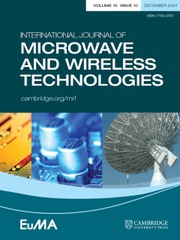Decision-directed phase noise compensation for millimeter-wave single carrier systems with iterative frequency-domain equalization
Published online by Cambridge University Press: 08 July 2010
Abstract
This paper proposes a receiver that repeats iterative frequency-domain equalization (FDE) and decision-directed phase noise compensation (DD-PNC) to alleviate degradation due to the phase noise for millimeter-wave single carrier (SC) systems. High bit-rate SC-FDE transceivers based on the single-chip Si RF-CMOS IC technology in the 60-GHz millimeter-wave band have been extensively studied for wireless personal area network (WPAN) systems, and the relatively large phase noise in a phase-locked loop (PLL) synthesizer severely degrades transmission performance. In an initial processing of the proposed receiver, a cyclic prefix (CP)-based phase noise compensator (CP-PNC) removes the phase noise from a time-domain received signal by using CP, which is known to the receiver, and the channel is equalized by the iterative FDE using the conventional minimum mean-square-error (MMSE) weight. In an iterative processing, DD-PNC estimates the phase noise each symbol by exploiting an output of a channel decoder, and then compensates the time-domain received signal for the phase noise by using the estimate. In order to equalize the compensated received signal, the iterative FDE performs both the MMSE filtering and residual inter-symbol interference cancelation using the decoder output. Computer simulations following the 60-GHz WPAN standard demonstrate that in the 64QAM with the coding rate of 3/4, the proposed receiver with three iterations can drastically remove the phase noise of −85 dBc/Hz at 1 MHz offset, and that it can achieve excellent transmission performance.
Keywords
- Type
- Original Article
- Information
- International Journal of Microwave and Wireless Technologies , Volume 2 , Special Issue 3-4: European Microwave Week 2009 , August 2010 , pp. 399 - 408
- Copyright
- Copyright © Cambridge University Press and the European Microwave Association 2010
References
REFERENCES
- 6
- Cited by


